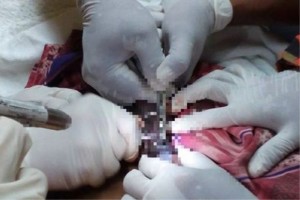MANILA, Philippines — The Food and Drug Administration (FDA) has finally approved the much-awaited vaccine against the deadly dengue virus, making the Philippines the first in Asia to make a vital step in the prevention of the disease.
In a statement on Wednesday, French pharmaceutical company Sanofi said the green light on the use of Dengvaxia in the Philippines followed closely the first approval in Mexico, where dengue has also been endemic.
It also noted that the FDA approved the vaccine for the prevention of the mosquito-borne disease caused by all four dengue strains in people aged nine to 45 years old living in endemic areas in the country.
“The approval of the first dengue vaccine in Asia, which bears 70 percent of the global disease burden is a major milestone in dengue prevention and public health,” stated Sanofi president and CEO Olivier Charmeil on Wednesday.
Dengue is the fastest growing mosquito-born disease in the world today, causing nearly 400 million infections annually, according to the World Health Organization. Asia has the highest dengue fever burden globally with roughly 67 million people getting infected every year.
In the Philippines alone, an average of 100,000 people get the disease every year and hundreds die due to the virus.
From January to October this year, the Department of Health has recorded 108,263 dengue cases nationwide and more than 300 deaths.
“Prevention of dengue is an urgent and growing medical priority in the Philippines,” said Dr. May Book-Montellano, president of the Philippine Foundation for Vaccination. “Vaccination is widely accepted as one of the most cost-effective ways to reduce the spread of infectious diseases like dengue,” she added.
The approval of the world’s first dengue vaccine in the Philippines will be a “critical addition” to the continuous public education and vector control efforts on dengue prevention in the country, according to Montellano.
Sanofi said it would introduce the dengue vaccine first in Asia and Latin America, where the virus has been a major public health priority, to reduce the burden globally and help achieve the WHO’s goal to reduce dengue mortality by 50 percent and morbidity by 25 percent by 2020 in endemic countries.
It also said the vaccine was the culmination of 20 years of scientific innovation and collaboration and 25 clinical studies in 15 countries around the world, where over 40,000 volunteers participated in the clinical study program.
Health Secretary Janette Garin said the Philippines participated in all three phases of the clinical development of Dengvaxia. The clinical studies were conducted in Cebu and several areas in Metro Manila, among others, she said.
In an earlier interview, Garin said the government must wait for the WHO pre-qualification of the vaccine and its guidelines and recommendations before it can proceed with the procurement. “It has to go through the procurement process. We also have to provide funding for that,” she said.
Garin also said the DOH has been seriously studying the possibility of making the dengue vaccine a Philippine Health Insurance Corp. benefit, making it available to enrolled members at a “very discounted price.” SFM


